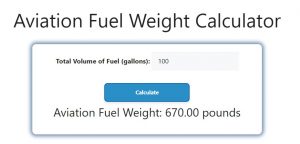About Aviation Fuel Weight Calculator (Formula)
The Aviation Fuel Weight Calculator is an essential tool for pilots, aircraft operators, and aviation professionals. Understanding the weight of aviation fuel is crucial for flight planning, as it affects aircraft performance, fuel efficiency, and overall safety. This guide will walk you through the formula for calculating aviation fuel weight, how to use the calculator effectively, and provide examples and FAQs to enhance your understanding.
Formula
The formula to calculate the weight of aviation fuel is:
Aviation Fuel Weight (AFW) = Volume of Fuel (VF) * 6.7
In this formula, the volume of fuel is measured in gallons, and the resulting weight will be in pounds. The value 6.7 represents the weight of one gallon of aviation fuel.
How to Use
- Determine the Volume of Fuel: Measure or obtain the volume of aviation fuel you will be using. This measurement is typically in gallons.
- Apply the Formula: Use the formula to calculate the weight of the fuel by multiplying the volume of fuel by 6.7.
- Result: The resulting value will give you the total weight of the aviation fuel in pounds.
Example
Suppose you have 100 gallons of aviation fuel. To find the weight, you would use the formula:
- Volume of Fuel (VF) = 100 gallons
Now, substitute the value into the formula:
AFW = 100 * 6.7
AFW = 670 pounds
Therefore, 100 gallons of aviation fuel would weigh approximately 670 pounds.

FAQs
1. What is an aviation fuel weight calculator?
An aviation fuel weight calculator helps determine the weight of aviation fuel based on its volume.
2. Why is it important to calculate aviation fuel weight?
Accurate calculations of fuel weight are crucial for flight planning, affecting aircraft performance, fuel efficiency, and safety.
3. What units are used in the calculation?
The volume of fuel is typically measured in gallons, and the weight is calculated in pounds.
4. How do I measure the volume of aviation fuel?
You can measure the volume of aviation fuel using fuel tanks, gauges, or by consulting fuel delivery records.
5. Can this calculator be used for different types of aviation fuel?
Yes, the calculator can be adapted for various types of aviation fuel, as long as the density remains consistent.
6. What is the density of aviation fuel?
The density of aviation fuel is approximately 6.7 pounds per gallon, but this can vary slightly based on the specific fuel type and temperature.
7. How does temperature affect fuel weight?
Temperature can affect the density of fuel; warmer temperatures may reduce the weight slightly, while cooler temperatures can increase it.
8. Is there a difference in weight between jet fuel and avgas?
Yes, jet fuel and avgas have different densities; therefore, the weight will vary based on the type of fuel used.
9. How can I ensure accurate measurements?
Use calibrated measuring equipment and double-check measurements for precision to ensure accurate calculations.
10. Can I calculate fuel weight in other units?
Yes, you can convert gallons to liters or kilograms, but make sure to use the appropriate conversion factors for accuracy.
11. How does fuel weight impact aircraft performance?
Increased fuel weight can affect takeoff, climbing, and overall aircraft performance, which is critical for safe operations.
12. What happens if I miscalculate fuel weight?
Miscalculating fuel weight can lead to performance issues, including overloading the aircraft or inadequate fuel for the flight.
13. Are there regulations regarding fuel weight calculations?
Yes, aviation regulations require accurate fuel weight calculations for safety and compliance with operational standards.
14. Can I use this calculator for flight planning?
Absolutely! The calculator is a valuable tool for flight planning, ensuring that you account for fuel weight in your calculations.
15. What are some other tools useful for flight planning?
Other useful tools include weight and balance calculators, performance charts, and flight management systems.
16. How often should I check fuel density?
It’s a good practice to check fuel density periodically, especially if you’re using different fuel types or suppliers.
17. What if I need to convert weight into kilograms?
To convert pounds to kilograms, divide the weight in pounds by 2.2046 to get the equivalent weight in kilograms.
18. Can I use this calculator for ground operations?
Yes, the calculator is also useful for ground operations where accurate fuel weight is needed for equipment or transport vehicles.
19. Is this calculator applicable for military aircraft?
Yes, the calculator can be used for military aircraft as well, but specific fuel densities may vary.
20. What are the safety considerations when handling aviation fuel?
Always follow safety guidelines, use appropriate protective equipment, and ensure proper ventilation when handling aviation fuel.
Conclusion
The Aviation Fuel Weight Calculator is a vital resource for aviation professionals, enabling accurate calculations of fuel weight based on volume. By understanding the formula and following the steps outlined, you can effectively plan your flights, ensure compliance with safety regulations, and optimize aircraft performance. Whether you’re a pilot, an operator, or involved in aviation logistics, accurate fuel weight calculations are essential for successful and safe operations.
